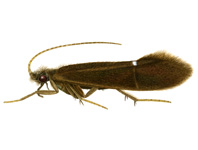Abstract
Protoptilinae Ross, 1956, is the most diverse subfamily belonging to the saddle- or tortoise-case-making caddisfly family Glossosomatidae Wallengren, 1891. The subfamily has a disjunct distribution: 5 genera are known from the East Palaearctic and Oriental regions; the remaining 13 are restricted to the Nearctic and Neotropical regions. Monophyly of Protoptilinae and each of 17 genera was tested using 80 taxa, 99 morphological characters, and mitochondrial DNA (COI). Additionally, homologies of morphological characters were assessed across genera and a standardized terminology for those structures was established. Mitochondrial DNA data were unavailable for 55 of the 80 taxa included in this study. To test the effects of the missing molecular data, 5 different datasets were analyzed using both parsimony and Bayesian methods. There was incongruence between the COI and morphological data, but results suggest the inclusion of COI data in a combined analysis, although incomplete, improved the overall phylogenetic signal. Bayesian and parsimony analyses of all 5 datasets strongly supported the monophyly of Protoptilinae. Monophyly of the following genera was also supported: Canoptila Mosely, 1939; Culoptila Mosely, 1954; Itauara Müller, 1888; Mastigoptila Flint, 1967; Mortoniella Ulmer, 1906; Protoptila Banks, 1904; and Tolhuaca Schmid, 1964. Several taxonomic changes were necessary for classification to reflect phylogeny accurately. Accordingly, Matrioptila Ross, 1938; Poeciloptila Schmid, 1991; Temburongpsyche Malicky, 1992; and Nepaloptila Kimmins, 1964, are designated new junior synonyms of Padunia Martynov, 1910. Additionally, the endemic Caribbean genera Campsiophora Flint, 1964, and Cubanoptila Sykora, 1973, are designated new junior synonyms of Cariboptila Flint, 1964. Diagnoses and a key to the subfamilies of Glossosomatidae and world genera of Protoptilinae incorporating these taxonomic changes are provided.

